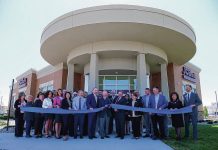The company building the $10 million Gateway Apartment project on the former Golden Foundry site is proposing a new senior housing apartment complex nearby.
Ohio-based Jonesboro Investments Corp. has received a favorable recommendation from the Columbus Plan Commission to rezone 3.36 acres at Michigan and 14th streets to build a three-story, 54-unit building with an estimated cost of $10 million.
The rezoning is now set to be heard by the Columbus City Council at 6 p.m. Oct. 6 in council chambers at City Hall.
The property is located in an area that is gradually transitioning from a mixed use of industrial and residential to increasingly residential, said Jeff Bergman, Columbus and Bartholomew County planning director.
Tim Morgan, Jonesboro president, said the neighborhood was chosen because it’s a focus of city redevelopment efforts and is located near the Gateway project and the company’s local partner, Housing Partnerships Inc.
Apartments in the senior housing complex would be rented to those age 55 and older and would be under income restrictions for affordable housing, Morgan said. Affordable new-construction senior housing is needed in Columbus, he said.
Jonesboro plans to finance the project the same way the Gateway apartments were funded, through tax credits from the Indiana Housing and Community Development Authority, Morgan said.
However, the Jonesboro company cannot apply for the tax credits if the property doesn’t have the multifamily zoning designation, Bergman said.
Jonesboro and city officials could find out next spring if the senior housing project will receive the tax credits or if another year will go by for the project to be considered again, Morgan said. If the city council approves the rezoning Oct. 6, Morgan plans to file the tax credit application on Nov. 6, he said.
It took three tries beginning in 2011, one each year, for Jonesboro to receive tax credits to build Gateway last year.
“It’s just a highly competitive process,” Morgan said. “We will do the best we can.”
Columbus planning officials said the property is located near the Grand Avenue Apartments to the northwest and Central Park Apartments and Gateway Apartments to the south. However, there are industrial buildings to the east and west of the proposed senior housing project.
The city’s comprehensive plan designates future land use of the parcel as residential, the planning department said. Although Jonesboro is asking for a 54-apartment senior housing development, the zoning would allow a maximum of 84 apartments on 3.36 acres, city zoning rules show.
For now, the project will stay at 54 apartments, Morgan said, although he didn’t rule out an expansion in the future.
Columbus Pallet Corp. owner Matt Sebahar told plan commission members his company has been on a portion of the property since 1983. But as the neighborhood has begun to trend residential, he is thinking about relocating the company, he said.
The pallet company is looking into some new products and increased capacity, which might require more space, he said.
Sebahar was reassured by the commission that he could continue to operate his pallet company on the property if the zoning is changed by the city council, as his industrial use of the property is grandfathered in until he makes a substantial change to the building.
During the public hearing about the zoning change, Columbus attorney Tim Coriden asked plan commission members to consider some additional requirements with the rezoning approval, including increased setbacks from nearby industrial property and a requirement of two parking spaces per apartment.
Coriden, representing the Indiana Research Institute at 1402 Hutchins Ave., said his client’s industrial facility is directly east of the apartment acreage and has been located there since June 1, 2006.
In a letter to the plan commission, Coriden described the company’s operations as light-duty industrial, involving assembly, light-duty manufacturing, shipping and receiving, heavy-duty transportation and equipment testing.
The company has concerns about increased vehicle and pedestrian traffic and sought conditional zoning — or that the zoning would revert back to industrial if Jonesboro did not move forward with the apartments within one year.
Bergman advised the commission against the temporary zoning proposal, saying Sebahar could come back to the plan commission to rezone the property back to industrial if the project didn’t go through and he wished the pallet company to remain there.
The company also asked for additional setbacks between the proposed apartments and the industrial area, including a fence with landscaping or opaque tree screen or a combination of both.
Bergman said if Jonesboro positions its apartments farther from the industrial area, with the parking area closest to the company, that should take care of the setback request.
The commission agreed to send a favorable request for the rezoning with the condition that the senior apartments have a similar lot placement as the Central Park Apartments — with the building pushed more toward the street with the parking in back. Jonesboro would be required to make curb, gutter and sidewalk improvements as required by the city and the buffering requirements beyond the landscaping.
Morgan said Jonesboro would address any concerns of surrounding property owners through the city’s site-plan approval process.
After the vote, commission member Dave Fisher commented that the plan commission often considers the buffering requirements to be a protection for residences when industrial companies locate nearby. In this instance, an industrial company already in place is asking to be protected from a proposed residential community, he said.
“We need to be mindful of the investment this company has already made,” Fisher said of the research institute’s requests. “Along the way, we need to be good stewards of our power, not willy-nilly with our decisions,” he said.




